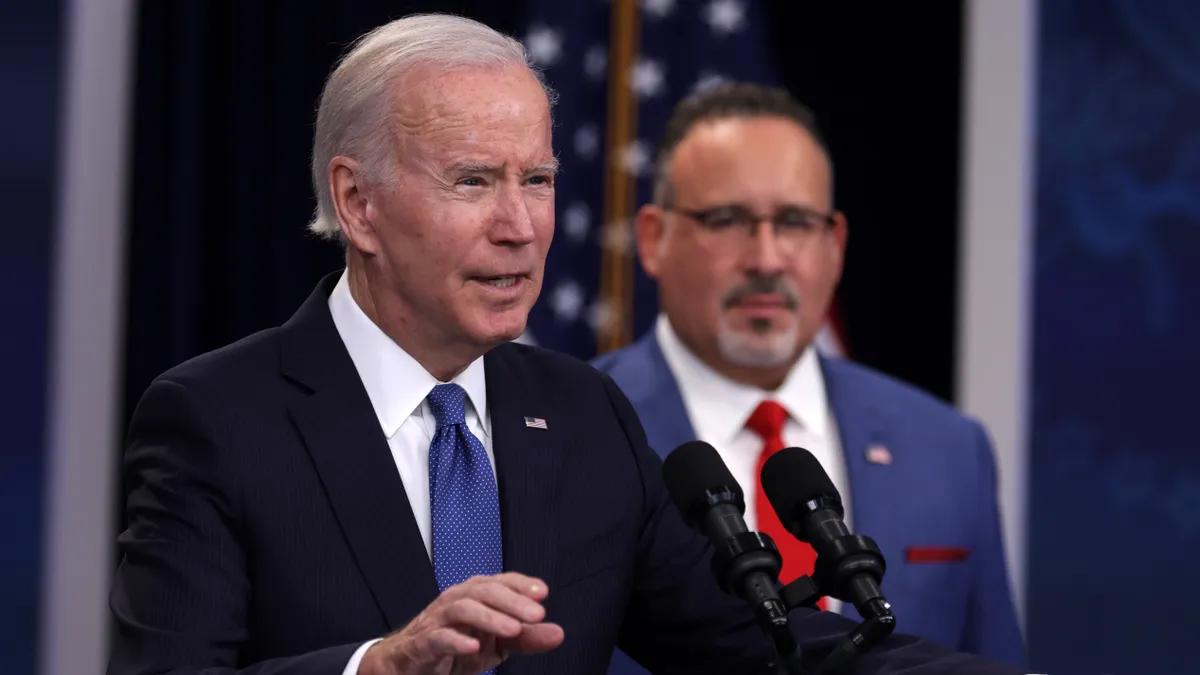President Joe Biden released an ambitious spending plan Thursday for FY 2024 with $90 billion for the U.S. Department of Education — a 13.6% or $10.8 billion increase over current budget allocations.
The proposal, which needs congressional approval, aims to improve academic success, the teacher pipeline, career readiness and global engagement, according to a press call Thursday with Education Department officials. The plan’s two largest spending categories for K-12 are for high-poverty schools, with $20.5 billion for Title I, and for pre-K-12 special education services, at $16.8 billion.
Other initiatives include $500 million for a new demonstration program to expand access to free preschool and $578 million to increase the number of school-based counselors, psychologists, social workers, and other health professionals in K-12 schools, as well as boost mental health supports in colleges.
Two days ahead of the two-year anniversary of the passage of the American Rescue Plan, which provided the largest one-time fiscal investment in education in response to the COVID-19 pandemic with $121.9 billion in funding, Biden’s latest annual budget proposal aims to continue addressing academic recovery efforts and closing achievement gaps — particularly through the $2.2 billion increase in Title I investments.
In a joint statement, Sens. Patty Murray, D-Wash., and Susan Collins, R-Maine, chair and vice Chair of the Senate Appropriations Committee, respectively, said they hoped to move through the budget approval process in a bipartisan manner.
But the plan will surely meet GOP resistance on Capitol Hill as Republicans have indicated an unwillingness to increase revenue with new taxes. "Mr. President: Washington has a spending problem, NOT a revenue problem," House Speaker Kevin McCarthy, R-Calif., tweeted Thursday.
Even amid a divided Congress, U.S. Secretary of Education Miguel Cardona said in a press call Thursday that it’s not time for the Education Department to lower expectations.
“I’ve always believed every student deserves high expectations, and the same should go for Congress,” Cardona said. “We cannot scale back our aspirations for the education of our children.”
The budget’s $500 million proposal to fund a new initiative for districts to expand free preschool in school and community-based settings “puts universal preschool within our reach,” said Roberto Rodriguez, the Education Department’s assistant secretary for planning, evaluation and policy development, during the Thursday press call. There’s also a request to provide $13.1 billion — an increase of $1.1 billion — for Head Start's early education services for young children from low-income families.
“We know there is no greater area in education that returns on investment than investing in early childhood education,” Rodriguez said. “This new investment builds on the president’s plan for a federal-state partnership that would support universal free preschool across the country.”
Spending priorities
The budget proposal would also help students with disabilities by providing a 17% increase for Individuals with Disabilities Education Act, or IDEA, Rodriguez said, adding that the “pandemic has had a disproportionate impact on children and students with the greatest needs.”
IDEA Part B grants to states would cover nearly 13% of the national average per pupil cost of special education services and provide an estimated average of $2,170 per child for about 7.5 million children ages 3-21, according to a budget summary.
Additionally, the budget requests $932 million in IDEA Part C grants to support early intervention services for infants and families with disabilities — a nearly $400 million increase over current spending.
As more evidence shows signs of the teacher shortage worsening since the pandemic, the budget proposal aims to invest $3 billion in educator preparation, development and leadership, according to the Education Department. That includes $132 million for the Teacher Quality Partnership program — an increase of $62 million from FY23 — and $30 million for the Hawkins Centers of Excellence program — an increase of $15 million — to expand the number of prospective teachers and improve diversity of the teaching profession.
Another $304 million is requested to address special education teacher shortages, while $200 million would go toward Teacher and School Leader Incentive Grants.
National Association of Secondary School Principals CEO Ronn Nozoe said in a statement that Biden’s proposed investments are critical steps in addressing the student mental health crisis and growing school leader and teacher shortages.
“School leaders have been burning the candle at both ends to support students’ academic and social development, and it’s great to see that President Biden has their backs,” Nozoe said.
FY 2024 begins Oct. 1. Other notable education-related budget requests include:
-
Expanding investments in community schools: To help schools provide wrap-around services, such as afterschool programs, adult education opportunities and health and nutrition services, the budget proposal calls for $368 million to support community schools, a $218 million increase from the FY23 enacted funding. Rodriguez said the budget would double community school funding for the third year in a row, if approved.
-
Supporting multilingual learners: The budget requests $1.2 billion for the English Language Acquisition program, an increase of $305 million, to help students learning English become proficient in English and academically successful. Aiming to take on teacher shortages among bilingual teachers, the budget proposes $90 million to hire these educators and $10 million in boosting the bilingual teacher pipeline through postsecondary fellowships.
-
Fostering diverse schools: To address racial isolation and concentrated poverty in schools, the budget requests $100 million to fund a grant program supporting voluntary community efforts promoting racial and socioeconomic diversity in their local schools.
-
Improving career and college pathways: The budget would provide $1.47 billion for Career and Technical Education State Grants, an increase of $43 million. Additionally, it would invest $200 million in the Career-Connected High Schools initiative by giving high school students more access to industry-backed credentialing, dual enrollment and work-based learning opportunities.
-
Enforcing civil rights: The budget plan also dedicates $178 million to the Office for Civil Rights, a 27% increase above fiscal 2023. OCR addresses students’ complaints of discrimination in federally funded K-12 schools and colleges and will likely be in the spotlight this year as the administration rolls out its proposed rule governing Title IX, which bans sex-based discrimination, including sexual violence, in schools.




















